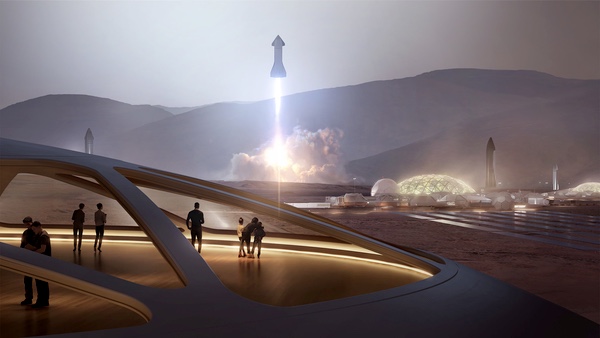Covid and Marsby Frank Stratford
|
| This mission to settle Mars is coming, and the changes we have seen in the last two years will be seen in time as the thing that changed our trajectory as a society. |
How did they accomplish these programs? Yes, the technology mattered; the tests and rapid developments made. But ultimately what got us there was "the right stuff", and not just from the men that went to the Moon, but from every person involved in the program and supporting the program. Attitudes of steel, forged in the fires of world wars and national crises.
Fast forward to 2021. The world is gripped by the crisis of our age: Covid-19, a plague claiming the lives of millions as we struggle to find solutions in a life-and-death battle royale. Economies are falling. Supply chains have been disrupted and permanently changed. Paradigms are shifting. At the same time new gateways have burst open and brought forward a new world of technological and societal developments that our corporatized world had halted for years.
I used to write articles about why and how we could go to explore and live on Mars. Honestly, it was discouraging with so much talk, debate, and inaction. The obstacles were always too big, too hard, and too risky. My last article even discussed those risks some six years ago (see “The risks of Mars”, The Space Review, August 24, 2015). People had an answer for every point I made. Maybe they were right. But today, our world has truly turned a corner. Technologies are being rushed forward in an effort to cope with a Covid world of lockdowns and emerging threats. Communications, the Internet, materials sciences, robotics, and aerospace technologies are being rapidly redesigned to deal with the new challenges of a world filled with closed borders.
These changes mean that sending humans to Mars is no longer a matter of if, but when. If entrepreneurs like Elon Musk have their way, it’s likely to come in the next 15 years. I don’t need to argue any longer about why we need to go: the whole “pushing frontiers to open new technologies” thing has become a moot point now in a world plunging trillions into new technologies.
This mission to settle Mars is coming, and the changes we have seen in the last two years will be seen in time as the thing that changed our trajectory as a society. The mechanics and engineering of how we can settle another planet haven’t stopped over the years, from groups like The Mars Society to governments and organizations across the world. Our moment, our time, has come, and while it will still take some years before arrival, when it does come, along with Moon bases and more, our world will finally have some new points of light to focus on in a sky darkened by decades of stagnation and fear.
| Our survival, our lives, and our future depends on many solutions coming together and today the pace to find them is at top speed. Mars will be a part of that future, and our choice is now not about arguing its merits but rather being a part of that journey or not. |
People can argue against why we should send humans to Mars but, in this author’s opinion, it is inevitable. We will have multiple beacons of society living and working around our solar system, ready to open up a much-needed universe of resources for a world in need. Finally, the needs we have as a society, especially in light of our current crisis, push us to seek answers. Space research has helped greatly in medical advances over the years, and no doubt will continue to in the future, and despite all the fear being projected upon us by our leaders right now, this is only the beginning of better things.
Our history is filled with great tales of plague, famines, war and struggle that lead to even bigger changes as a result. The events of 2020–21 will prove to be similar and it’s obvious wherever you look. Our survival, our lives, and our future depends on many solutions coming together and today the pace to find them is at top speed. Mars will be a part of that future, and our choice is now not about arguing its merits but rather being a part of that journey or not. It will happen with or without us.
The ideas and motivation of a new generation is rising right now for the challenges ahead on this world and others. I am amazed to be living in such times but no longer discouraged or dismayed. The new days of action are upon us now. Watch this space.
Note: we are using a new commenting system, which may require you to create a new account.
